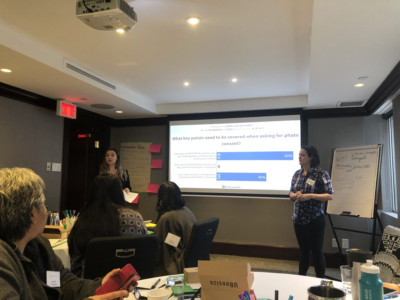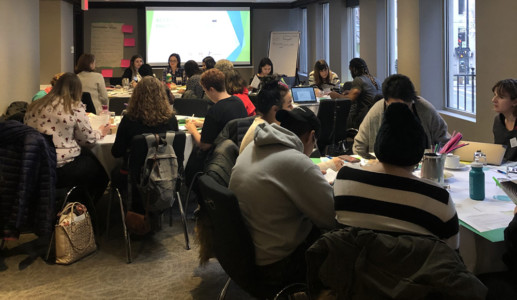Overview
ACCESS Open Minds is the first network funded under CIHR’s Strategy for Patient Oriented Research (SPOR). The ACCESS Open Minds research strategy was co-developed by network members including youth, families/carers, Indigenous community members, researchers and decision makers from across Canada to generate new answers about big questions in youth mental health needs and services across Canada.
For more information about the ACCESS Open Minds Research Protocol check out our protocol in this open access journal article.
-
Co-creating Research with Youth, Families and Communities
ACCESS Open Minds set out to transform the youth mental health system; including how research is typically done.
From our early days starting with the TRAM process, youth, families/carers, service providers and decision makers have joined forces with leading researchers to make sure we are asking the right questions, using the right tools and considering the right approaches – creating the next generation of patient oriented research in Canada.
Check out our governance structure to learn more about stakeholder engagement.
Some products of our co-creation activities include:
- A standardized protocol to evaluate youth mental health services across Canada – taking into account key questions and using tools and approaches developed with youth, families/carers, clinicians, researchers and Indigenous partners (read more about this here)
- Capacity building and training strategy to increase on the ground capacity across Canada for services to see more youth, and provide youth friendly care
- Core-values for ACCESS Open Minds as a network, and for clinicians in the delivery of youth friendly services (learn more here)
- Publications, conferences, presentations and knowledge translation: youth and families/carers lead and contribute to the creation of publications and participate in conferences. They are members of the ACCESS OM Authorship and Publications Committee that review and provide feedback on academic materials.
- Photovoice qualitative project: a team co-led by youth and families trained peer-researchers to conduct this project at 10 sites across the network
- Family peer support survey
- Qualitative research strategy
- Our Network Meeting Working group that leads the planning and design of the ACCESS OM’s biggest event, ensuring that the meeting of the entire network is relevant to youth and family/carers and other participants
We would like to thank every one of our patient partners from the ACCESS Open Minds network, both past and present, who have helped create this groundbreaking initiative!
-
Standardizing Evaluation in Youth Mental Health Services
Each ACCESS OM site looks a little different; we believe that each youth and community is unique and that our approach works because it is built from the ground up – starting with community assets and strengths to create sustainable, effective services.
What is the same across our sites is how the impact of the services are evaluated and measured at individual, service and population levels. This standard approach to evaluation means that youth receive high quality, evidence-based care and allows services to use data to respond to the needs of their clients. It also means that decision makers and funders are able to understand the real impacts using apples to apples comparisons.
Most importantly, it means that we can understand how youth are doing, and how services are operating across the country. For example, by using the same definition of wait times, we are able to track and understand what wait times look like in urban Alberta compared to rural Cape Breton. We are also able to understand how youth are doing across the country, and what the impact accessing services has had on their well being and individual outcomes.
-
A Learning Health System for Youth Services
By creating the first pan-Canadian online data repository that feeds information back to clinicians and service providers in real-time and allows for national level insights, ACCESS OM is one of the first real-world learning health systems created in Canada.



